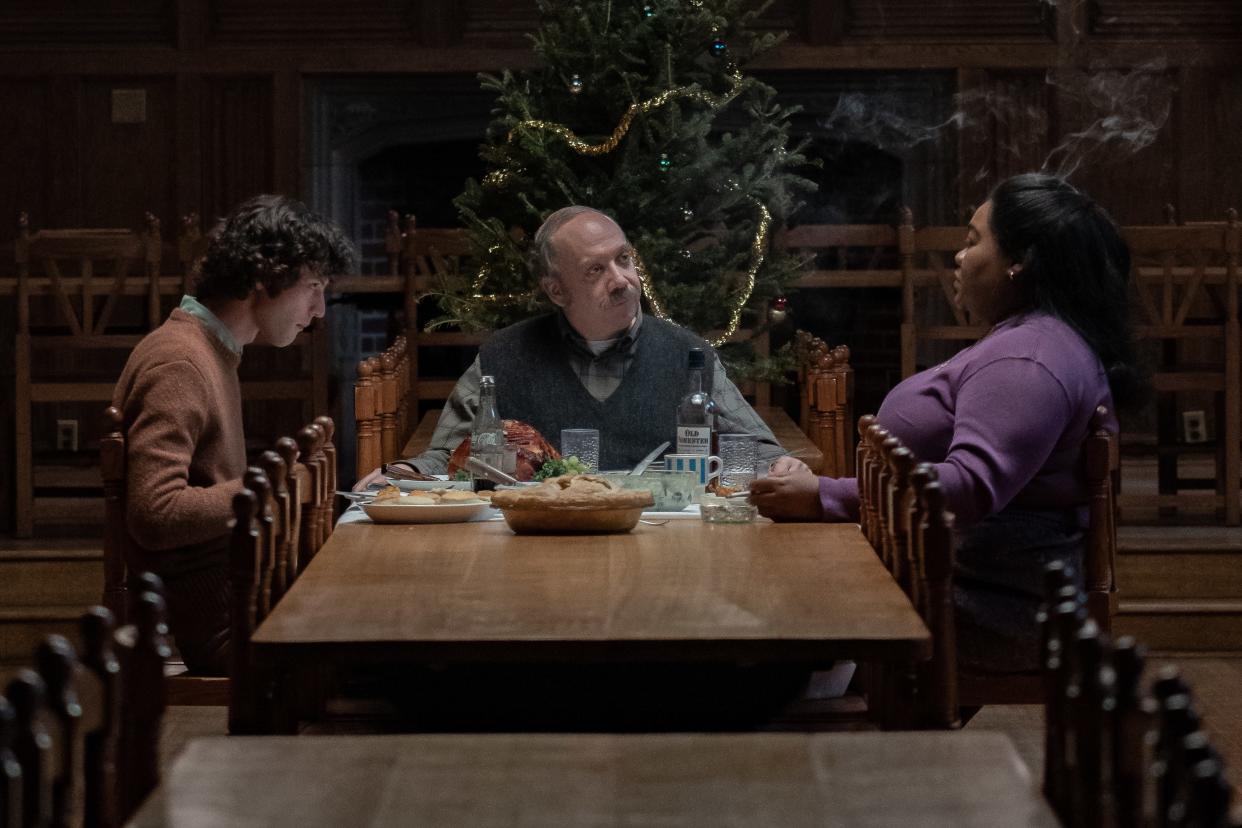‘The Holdovers’: How an Unmade TV Pilot, an Obscure 1930s French Film, Some Viciously Erudite Insults, and a Party Bus Shaped Alexander Payne's New Prep-School Comedy

- Oops!Something went wrong.Please try again later.
- Oops!Something went wrong.Please try again later.
- Oops!Something went wrong.Please try again later.
Seacia Pavao
In Alexander Payne's The Holdovers, classics teacher Paul Hunham (Paul Giamatti) hurls some of the best onscreen insults in recent movie history. They’re devoid of foul language, but somehow they hit harder than any F-bomb would have.
The film's writer, David Hemingson, has weathered them all. Hemingson’s uncle, Earl Cahail, had a hand in raising him, and many of Hunham’s best jabs— “entitled degenerates,” “snarling Visigoths”—came straight from Cahail’s mouth. It all came from a place of love, Hemingson says, but “everything was filtered through these incredibly rococo insults.”
"It's like being in a writers room," he says. "If they're insulting you in a writers room, it means they love you. If they're being polite to you in a writers room, you have something to worry about."
At 59, Hemingson is making his (big-)screenwriting debut, after a long career in television that included creating spy show Whiskey Cavalier and the short-lived adaptation of Anthony Bourdain’s Kitchen Confidential, as well as stints on shows like How I Met Your Mother and Don't Trust the B— in Apartment 23. (Hence his intimate knowledge of writers' room abuse.) And while the idea for the Christmas-set film originated with Payne, Hemingson made it personal.
Before The Holdovers, Hemingson had written a "90 percent" autobiographical pilot about a kid from a lower-middle-class background being sent to a tony prep school on a scholarship to get to know his father, who is teaching there. The script found its way to Payne, who didn't want to make it—but had another idea he thought Hemingson could tackle.
Payne had gotten the idea for a film about a character Hemingson describes as an "odiferous, ocularly challenged professor" after seeing the rare 1935 French film Merlusse. The unfilmed pilot gave Payne the sense that Hemingson knew the world he was trying to capture, and Hemingson jumped at the opportunity. "If Alexander Payne calls you up—out of the blue, ostensibly—and says 'do you want to write a movie for me?' The answer is always yes," Hemingson says.
What resulted is Payne’s acclaimed new film, in which Giamatti’s Hunham, a stickler with a chip on his shoulder, is stuck at school over Christmas with an angry rapscallion Angus Tully (Dominic Sessa) and cafeteria manager Mary Lamb (Da'Vine Joy Randolph), who’s grieving the loss of her son in Vietnam.
Hemingson only took the logline of Merlusse and then spun out his story in a different direction. After initially debating whether to set the film in 1958 or 1970, they landed on the latter, in part because they didn't want to feel like they were repeating Peter Weir's Dead Poets Society.
Another way he avoided Dead Poets-syndrome was getting rid of all of the other students except for Angus. In the film, a helicopter arrives to pick up a football player, who’s been left at school for refusing to cut his hair. His rich dad has finally given up on punishment, and sets down his chopper on school grounds. All the other children get to accompany this jock on his ski vacation, except for Angus, whose parents can't be reached. Hemingson based this plot point on an incident he witnessed in college.
"A friend of mine was having a 20th birthday party and this bus showed up at Yale—it was like the Aerosmith tour bus," he remembers. "We all loaded onto this tour bus and traveled to a distant location to have a party, partying the entire time. And I'm like, The rich are different, man." (Payne was doubtful that the sequence would work, arguing it was "deus ex machina"; Hemingson says he told him that was the point.)
When Payne told Hemingson shortly after their first call that he wanted his Sideways star Paul Giamatti for the lead role, it was another instance of kismet. Hemingson's father, who never graduated high school, attended Yale on the G.I. Bill after serving in the Merchant Marine in World War II. In college, Hemingson's dad knew Giamatti's father—A. Bartlett Giamatti, a literature professor who became the president of the university in 1978.
The younger Giamatti, who also attended Yale, understood immediately what Hemingson was thinking for his character, a man Hemingson describes as a "rumpled heap of corduroy with ash on the lapel." Hunham also ends up representing Hemingson's own feelings about the way class functions in elite institutions like the fictional Barton or the very real Yale.
Hunham is constantly frustrated by the boys he sees wasting their top notch education, thinking they can easily slide to another fancy school with little challenge or actual learning. "There are all these kinds of coded things that people acknowledge or don't acknowledge," Hemingson says. "Old money versus new money versus scholarship versus somebody whose family name is on the library. People get invited to certain things and other people don't get invited to certain things, and there's a subliminal percolating class system."
At the same time, Hunham is a tribute to Cahail, a man who came from nothing and ended up working at the UN. A man who used to wake Hemingson up like Hunham wakes up his charges—by saying "It's daylight in the swamp."
Originally Appeared on GQ

